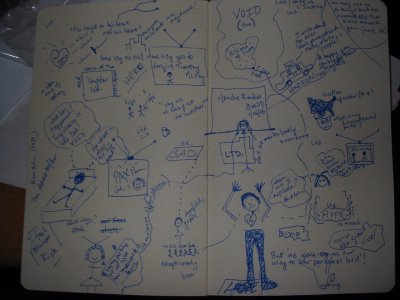
I'd not ever heard her read before, and although I was certainly familiar with her name, I knew little about her work, probably because Graywolf press is not the press I look to first for interesting, innovative literature, etc. I did like her reading, though. The work in Don't let me be Lonely is a lyric essay/memoir/documentation of 2000-2004, years that are of obvious political significance. Lots of refrences to Homi Bhabha, especially Location of Culture. What I liked: The pieces worked with "big" words like "hope," "sad," "forgiveness," and "here," without directly working through or trying to reclaim "justice" (Someone in the audience pointed this out). There's a sense of trying to understand/articulate what the political situation in the US is doing to actual people and bodies. A focus on emotion (sad, hope, forgiveness) and social interaction (here we are, I'm here, we're here, here you go), people interacting with each other or not: "...why are we here if not for each other?"
This reminds me of a conversation that Rodrigo and I were having after the DC poet's group reading at MLA along the lines of: the revolutionary moment is not on the barricades anymore, of course, but in human interaction, in the social, in not being a masochistic asshole to the people you work with. So the notion of "justice"--it's not irrelevant, but if it is to be useful it must mean something quite different than righting a wrong. Most of the wrongs can't be righted, and we don't even have access to the information that would help us know what all the wrongs are, but we know that people are dead, a lot of them, human social and emotional interaction seems to be a good place to start. This also reminds me of Juliana Spahr's This Connection of Everyone with Lungs and something she said at the seminar before she read with John Kinsella at Georgetown: wanting to reclaim guilt (usually a topic shunned if you're avant-garde) as being something useful, that saying I'm sorry, complicit is at least a place to start.
The word "guilt" still makes me cringe though, and poetically wresting it from its deeply lodged position in the hearts of all white middle class peoples is going to be difficult. Guilt, I think, is at the heart of the passive-agressive structure of all bureaucracies. Examples:
- the boss who refuses to tell you what to do (because, after all, everyone should be equal and innovative business management books say we should do away with hierarchy but really I love my power) but then nails your ass when you don't do the task exactly the way s/he wanted.
- The boyfriend/girlfriend that creates a bogus fight to have an excuse to break up because it's not nice to break up with someone just because you don't love them.
And here we have wandered far from poetry. But what would a passive-agressive poetic form be like? Tricky narrative? Ahh, too much of the psychobabble that I do love.
Here's the traffic on 5 heading north from a yummie postreading pasta dinner:









1 comment:
Lorraineish, i'm not sure about the human interaction thing. i mean of course it's way real and important but doesn't for me constitute a politics in the face of systemic poverty and religious idiocy. there's people that one shouldn't be nice to cuz you can be very sure they aren't gonna be nice to you. this congress just cut medicare funding to children as a budget reduction measure. it'd be 'nice' of them to not do that and maybe not make a few bombs if they want to save money, ey?
old fashioned return of democratic radicalism-- the strike and the boycott-- that's what's needed, & yes, don't be a stupid spouse or boss.
there's some interesting stuff re scary religious bourgeios hell at samharris.org. check out the audio.
Post a Comment